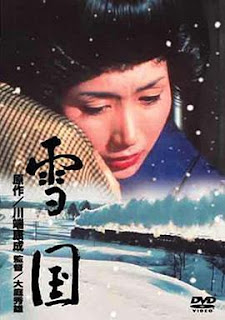67. Sai-hū mā tâi tī hia
Hit-ê cha-po͘ pēⁿ kah chin siong-tiōng hit-àm, yi tī Shimamura hia kòe-mê:
"Góa chò góa kah-ì ê tāi-chì, boeh sí ê lâng kám ē-sái chó͘-tòng?" Yi kā hûn-su pàng hō͘ i, mā bat án-ne kóng kòe.
Iáu koh ū, Komako tng-tih sàng Shimamura kàu chhia-thâu ê sî, Yoko kóaⁿ lâi chhōe yi, kóng pēⁿ-lâng í-keng chin giâm-tiōng ah, Komako kan-ta kiâng-kiâng m̄ túiⁿ. Āu-lâi ká-ná mā bô kìⁿ tio̍h chòe-āu chi̍t-bīn. Chū án-ne, Shimamura ê sim-lāi oa̍t-lú ē-kì-lih hit-ê kiò-chò Yukio ê cha-po͘-lâng.
Komako chóng-sī siám-phiah kóng Yukio ê tāi-chì. Tō-kóng yi m̄-sī i ê bī-hun-chhe, m̄-koh ūi tio̍h i ê liâu-iáng-hùi, yi lâi chia chò gē-tòaⁿ, he khak-si̍t mā sī chi̍t-chân "téng-chin ê tāi-chì".
Shimamura sui-jiân hō͘ la̍t-chí kòng tio̍h, pēng bô siū-khì. Komako gāng chi̍t-ē, sûi tō ká-ná núi khì, hûn-su pàng hō͘ i hû tio̍h:
"Eh, lí sī láu-si̍t-lâng neh. Lí ū sáⁿ-mih siang-sim ê tāi-chì?"
"Chhiū-á téng ê gín-á ē khòaⁿ tio̍h lán."
"Tokyo-lâng chiâⁿ ho̍k-cha̍p. Sì chiu-ûi chhá-chhá nāu-nāu, sim-sîn sòaⁿ phún-phún."
"Ta̍k-hāng lóng sòaⁿ phún-phún."
"Taⁿ, liân miā mā sòaⁿ khì ah. Lán khì khòaⁿ bōng, hó bô?"
"Chin-ê?"
"Lí khòaⁿ! Lí kin-pún bô siūⁿ boeh khòaⁿ bōng."
"Sī lí ê sim-lāi tih gāi-gio̍h lah."
"Góa chi̍t-pái to bô khì kòe, chiah ē gāi-gio̍h. Chin-ê, chi̍t-pái mā bô. Taⁿ, sai-hū mā tâi tī hia, só͘-í kám-kak tùi-put-khí sai-hū. Kàu taⁿ koh-khah phái-sè khì, bē-su ké tak-tak."
"Lí pí góa koh-khah ho̍k-cha̍p neh."
"Án-nóa kóng? Kì-jiân hām oa̍h-lâng kóng bē chheng-chhó, siāng-bô tùi sí-lâng ē-sái kóng bêng-pe̍k."
--
67. 師傅 mā 埋 tī 遐
彼个查埔病 kah 真 siong 重彼暗, 她 tī Shimamura 遐過暝:
"我做我佮意 ê 代誌, 欲死 ê 人敢會使阻擋?" 她 kā 魂軀放予伊, mā bat án-ne 講過.
猶閣有, Komako 當 tih 送 Shimamura 到車頭 ê 時, Yoko 趕來揣她, 講病人已經真嚴重 ah, Komako 干焦 kiâng-kiâng 毋 túiⁿ. 後來 ká-ná mā 無見著最後一面. 自 án-ne, Shimamura ê 心內越 lú 會記 lih 彼个叫做 Yukio ê 查埔人.
Komako 總是閃避講 Yukio ê 代誌. Tō 講她毋是伊 ê 未婚妻, 毋過為著伊 ê 療 iáng 費, 她來遮做藝旦, 彼確實 mā 是一層 "頂真 ê 代誌".
Shimamura 雖然予栗子摃著, 並無受氣. Komako 愣一下, 隨 tō ká-ná núi 去, 魂軀放予伊扶著:
"Eh, 你是老實人 neh. 你有啥物 siang 心 ê 代誌?"
"樹仔頂 ê 囡仔會看著咱."
"Tokyo 人誠複雜. 四周圍吵吵鬧鬧, 心神散 phún-phún."
"逐項攏散 phún-phún."
"今, 連命 mā 散去 ah. 咱去看墓, 好無?"
"真 ê?"
"你看! 你根本無想欲看墓."
"是你 ê 心內 tih 礙虐 lah."
"我一擺 to 無去過, 才會礙虐. 真 ê, 一擺 mā 無. 今, 師傅 mā 埋 tī 遐, 所以感覺對不起師傅. 到今閣較歹勢去, 袂輸假 tak-tak."
"你比我閣較複雜 neh."
"Án-nóa 講? 既然和活人講袂清楚, 上無 tùi 死人會使講明白."
--
67.
(Shimamura had not forgotten. Indeed, the memory gave the man Yukio a certain weight in his thoughts.)
Komako seemed to dislike talking about Yukio. She was not his fiancee, perhaps, but she had become a geisha to help pay doctors' bills. There was no doubt that she had been "completely in earnest."
Shimamura showed no anger even under the barrage of chestnuts. Komako looked curiously at him, and her resistance seemed to collapse. She took his arm. "You're a simple, honest person at heart, aren't you? Something must be making you sad."
"They're watching us from the trees."
"What of it? Tokyo people are complicated. They live in such noise and confusion that their feelings are broken to little bits."
"Everything is broken to little bits."
"Even life, before long. . . . Shall we go to the cemetery?"
"Well. . . ."
"See? You don't really want to go at all."
"But you made such an issue of it."
"Because I've never once gone to the cemetery.
I really haven't gone once. I feel guilty sometimes, now that the teacher's buried there too. But I can't very well start going now. I'd only be pretending."
"You're more complicated than I am."
"Why? I'm never able to be completely open with living people, and I want at least to be honest with him now that he's dead."
--


No comments:
Post a Comment